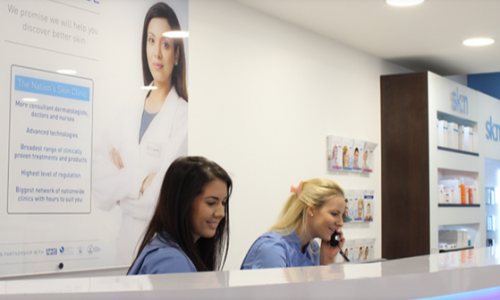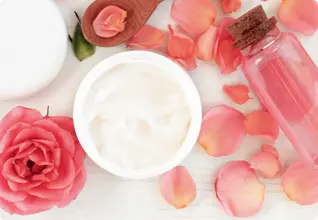How can I minimise my risk of developing acne? Our experts dispel some myths around food

The NHS has asserted that acne is not a diet-related condition. Yet, as new research is conducted and common thought becomes further convinced of the role diet plays in acne, the foods that cause acne – or minimise it – need to be put to the test.
Acne is often caused by changing hormonal levels, where sudden fluxes in hormones cause the sebaceous glands to release excess sebum (oil) through the skin. The build-up of excessive oil, debris and dead skin cells results in the spots developed during an acne outbreak.
Does dairy cause acne?
New research suggests that there is a correlation between dairy consumption and acne. As dairy products, such as cheese, butter and yogurt, are made from milk, milk can cause changes in the body and contribute to the irritation and inflammation of acne.
Milk contains hormones that enhance growth and build muscle. Its consumption can disrupt your hormone levels and cause the sebaceous glands to compensate by overproducing oil.
Milk can also contribute to the elevation of insulin in the body which can boost sebum production and cause inflammation. As your body is sensitive to hormone fluctuations, any rise in hormones can trigger acne flares and worsen acne symptoms.
There is also research that indicates a positive association between the consumption of low-fat, skimmed milk and acne.
If you have noticed a negative change in your skin, one that occurs due to higher levels of dairy consumption, consider temporarily omitting or reducing dairy from your diet. If you notice an improvement in your skin, dairy could be the cause of your acne and committing to a dairy-free diet could help relieve your symptoms.
Does chocolate cause acne?
As white and milk chocolate have high fat, milk and sugar contents, it is usually the consumption of these ingredients that can worsen any existing skin conditions.
Whilst high percentage dark chocolate has numerous health benefits, such as being high in antioxidants, vitamins A, C and E, improving memory and reducing stress, it is usually the combination of milk and sugar found in chocolate bars that results in any flares of acne, rather than chocolate itself. As good quality dark chocolate contains less milk, it has less chance of negatively impacting your acne.
Can coffee cause acne?
Although drinking coffee is not a direct cause of acne, it can influence pre-existing acne. Coffee contains caffeine which makes you feel hyperactive and awake. This alertness can elevate cortisol levels in the body and as cortisol is one of the stress hormones, prolonged levels cause abnormal spikes and temporary hormonal imbalances.
The flux after a cup of coffee can cause an overactivity in the sebaceous glands where the sebum (oil) released contributes to the blockage of pores and development of spots. Consuming too much caffeine could be the cause of recurring acne outbreaks.
The way you take your coffee can also affect acne. Milk and sugar can irritate the skin, so drinking your coffee black can minimise any negative aftereffects. Green tea can also be an alternative to coffee and has high antioxidant properties which can reduce inflammation caused by acne.
Does alcohol cause acne?
Drinking alcohol is not a direct cause of acne, yet it does have harmful effects to the skin. Alcohol has been linked to increased dehydration and inflammation, reduced immune system function and hormonal imbalances which can all trigger acne and aggressive outbreaks of cysts.
Heavy consumption of alcohol can deprive the skin of nutrients, water and oxygen, and reducing your alcohol intake can have a series of benefits to restore the skin’s natural vitamins and improve the overall appearance of your complexion.
Does sugar cause acne?
Sugar itself does not cause acne, it is the hormonal effect sugar creates that can lead to aggravated episodes of acne. Sugar and sugary foods are high on the glycaemic scale, meaning once consumed, they rapidly increase your blood sugar levels.
As blood sugar levels rise, more insulin is produced to absorb the sugar and convert it into energy. Sudden elevations of insulin stimulate the production of androgens, which are hormones that are very receptive to the sebaceous glands, causing inflammation and excess oil release that worsens acne.
Do eggs cause acne?
There is no research suggesting that eggs cause acne. If anything, they can improve acne as when you eat eggs, you are consuming phospholipids and bioactive compounds that promote good health and have anti-inflammatory properties. Eggs are high in omega 3 which can also benefit acne by regulating the overproduction of sebum and reduce inflammation.
Does whey protein cause acne?
Research shows there may be a link between whey protein and acne. As acne has been associated with milk consumption, whey protein is found in milk and can cause insulin to fluctuate, which may affect pre-existing acne. Pea protein is a good alternative to whey protein that does not contain dairy and may not trigger acne flares.
Key takeaways
While foods like coffee, alcohol and chocolate are not directly linked to acne, they can aggravate flare-ups and increase inflammation.
Existing research shows a positive correlation between dairy and the development of acne, so avoiding dairy products and opting for free-from alternatives may reduce the symptoms and clear out the skin.
At the same time, sugary foods can also cause hormonal imbalances which may lead to acne development.
Maintaining a healthy, balanced diet can help minimise the risk of developing acne, as well as relieve symptoms for those already struggling with this condition.
Need help?
Our dermatologists can provide further information on the cause of your acne and create a bespoke treatment plan for you. Find your nearest clinic and book a consultation today!
Alternatively, read on to find out if these home treatments really work to fight acne.
Related Articles

08
Apr 2024

08
Apr 2024
Request a callback
One of our friendly sk:n advisors will call you to book your consultation.
- More than 450 consultants, doctors, nurses and medical practitioners
- Regulated by the Care Quality Commission, Health Inspectorate Wales and Health Improvement Scotland
- Partner of the NHS
- Rated excellent by our clients on Trustpilot
- Strict safety and care protocols





